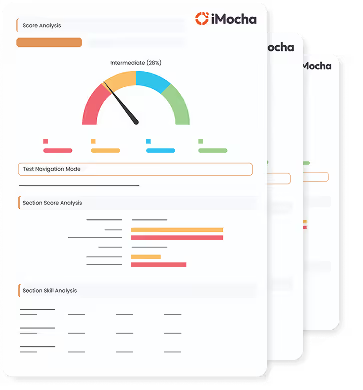


Choose easy, medium, or tricky questions from our skill libraries to assess candidates of different experience levels.
Choose easy, medium, or tricky questions from our skill libraries to assess candidates of different experience levels.

Choose easy, medium, or tricky questions from our skill libraries to assess candidates of different experience levels.

Choose easy, medium, or tricky questions from our skill libraries to assess candidates of different experience levels.
This a comprehensive PDF report, which you can instantly download and share with your hiring team or candidates for seamless collaboration.
Download Sample Report



The Java Full Stack Developer Skills Test evaluates a candidate's ability to work across front-end and back-end development. It assesses skills in Core Java 8, Java coding, JavaScript, and SQLite to ensure candidates can design, build, and maintain scalable full stack applications.





%20(1).webp)
A full-stack developer is an engineer who can handle all the tasks of databases, servers, systems engineering, and clients. Full stack Java developer understands multi-tier web application architecture with appropriate levels of abstraction within various architectural layers. They can evaluate the business requirements to determine the most appropriate technical architecture and design patterns by implementing high-performance and scalable enterprises.
Java full stack developer skill test helps to hire managers and recruiters to find the best suitable candidate by assessing their ability to work on both front-end and back-end development. Full-stack Java web developer test questions are designed and validated by subject matter experts (SMEs) to assess and hire full-stack Java developers as per industry standards.
The following Java Full Stack Developer skills are crucial for achieving proficiency as a Java Full Stack Developer and thriving in the role.

Java full stack developer skills test helps to screen the candidates who possess traits as follows:
Full stack Java web developer test contains the latest & quality set of scenario-based questions to assess the operational experience of the candidate. Moreover, you can add your questions as per the job requirement. Full stack Java development atests may contain MCQs (Multiple Choice Questions), MAQs (Multiple Answer Questions), Fill in the Blanks, Whiteboard Questions, Audio / Video Questions, LogicBox (AI-based Pseudo-Coding Platform), Coding Simulators, True or False Questions, etc.







.webp)
.webp)
.webp)
.webp)